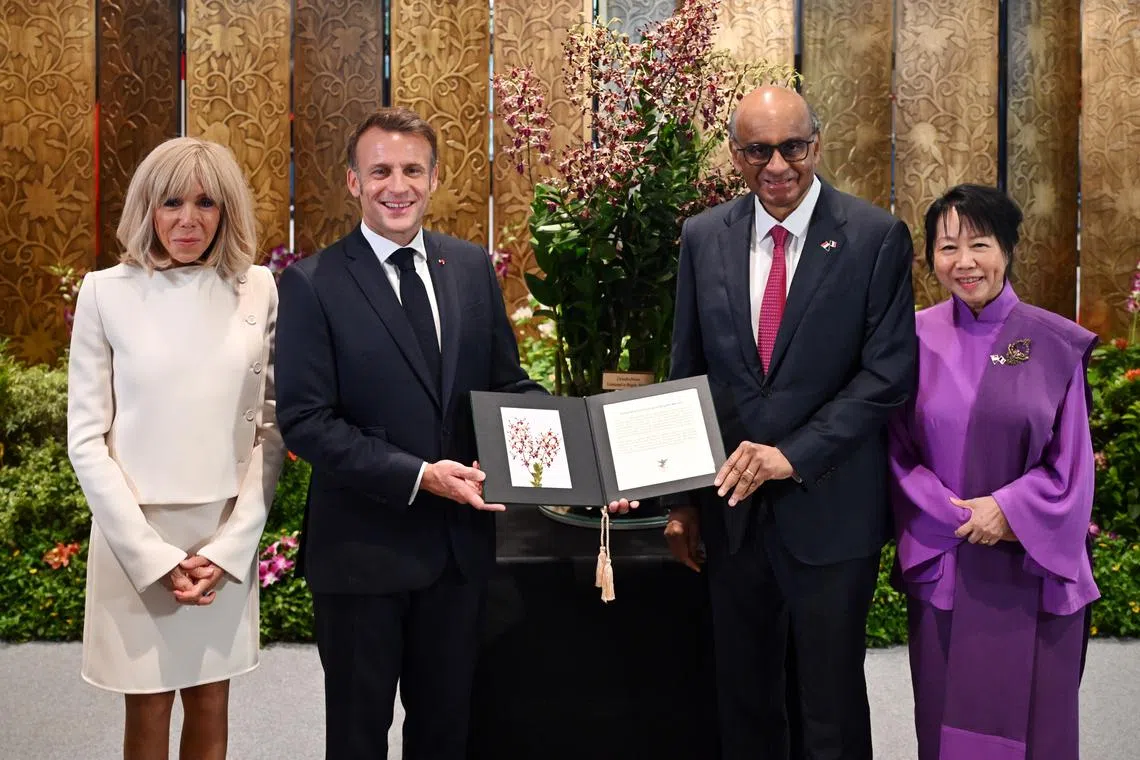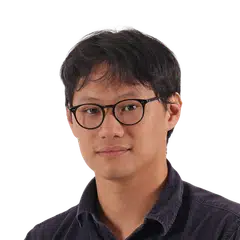S’pore and France to expand defence ties, cooperate on nuclear energy in upgraded relationship
Sign up now: Get ST's newsletters delivered to your inbox

Prime Minister Lawrence Wong and French President Emmanuel Macron witnessed the exchange of 13 agreements at a ceremony in Parliament House on May 30.
PHOTO: LIANHE ZAOBAO
Follow topic:
SINGAPORE – France and Singapore will expand cooperation in areas such as civilian nuclear energy, intelligence sharing and defence technology, upgrading their relationship to a Comprehensive Strategic Partnership (CSP).
This is Singapore’s first CSP with a European country – an upgrade to a strategic partnership signed in 2012 – and was announced by both countries at a joint press conference on May 30.
Prime Minister Lawrence Wong and French President Emmanuel Macron witnessed the exchange of 13 agreements at a ceremony in Parliament House on the second day of a state visit by Mr Macron.
At a joint press conference following the exchange, both leaders emphasised the continued importance of rules-based international engagement amid a shifting global order rocked by an ongoing trade war between China and the US.
PM Wong said that in an uncertain world, it is even more important for like-minded countries such as France and Singapore to work together.
He said: “That’s why President Macron and I have agreed to upgrade our bilateral ties with a Comprehensive Strategic Partnership. This will deepen our cooperation in existing sectors and expand our collaboration in new areas like decarbonisation and digitalisation.”
Speaking in French, Mr Macron said there is a “community of views” between France and Singapore, raising the example of Singapore’s stance on the Ukraine war, where Singapore sanctioned Russia following its invasion in 2022.
He said the CSP signifies the deep trust between the countries, and added his hopes for further cooperation in the business domain.
Mr Macron arrived in Singapore on May 29
Tapping French nuclear expertise, expanding security ties
On nuclear energy, the countries signed agreements to facilitate cooperation on safety, workforce development, research, environmental protection, the protection of public health and emergency preparedness and response, among others.
PM Wong said the agreements will help Singapore tap French expertise in the field as it explores the possibility of civilian nuclear energy. France is a global leader in nuclear energy, deriving about 70 per cent of its power from it.
Turning to defence, PM Wong said the domain has always been a “pillar” of the relationship between the two countries.
He said: “Under the new partnership, we will enhance cooperation in other areas, including deployment of defence technology and critical and emerging technologies. We will also reinforce the journey of cooperation, including by establishing a senior officials’ dialogue.”
The countries exchanged three agreements to deepen and expand their defence relationship across multiple domains of mutual interest and shared expertise, including non-traditional domains like digital defence.
The agreements also provide for the enhancement of a joint research and development laboratory established in 2023 to develop artificial intelligence (AI) capabilities.
In addition, the countries signed an agreement facilitating the sharing and mutual protection of classified information between France and Singapore.
Known as the France-Singapore General Security Agreement, it will support and deepen security cooperation in areas of mutual interest beyond defence, including counter-terrorism and cyber security.
The two countries also signed an agreement to provide for the extradition of fugitives between them.
AI for public good, deeper air and sea collaboration
Both countries agreed to work together on technical and vocational education, and unveiled a road map to deepen collaboration on digital policy and innovation.
This sets out new areas of collaboration such as technical exchanges on how AI can enhance the delivery of public services.
The two countries signed an agreement to strengthen cooperation to advance the use of safe and trustworthy AI.
It outlined several areas of collaboration between Singapore and France’s AI Safety Institutes, including exchanging knowledge on AI safety, joint testing and evaluation of AI models and collaborative research to advance safe and trustworthy AI.

The orchid naming ceremony for French President Emmanuel Macron (second from left), pictured with President Tharman Shanmugaratnam and their wives, Mrs Brigitte Macron and Ms Jane Ittogi, was held at Parliament House on May 30.
ST PHOTO: KUA CHEE SIONG
The two countries also agreed to deepen the relationship between their maritime and aviation regulators. Under these agreements, the Civil Aviation Authority of Singapore (CAAS) and the Direction Generale de l’Aviation Civile will collaborate on major areas like safety and security and air traffic management.
CAAS has signed an agreement with French multinational aerospace and defence company Thales to jointly set up an International Avionics Lab in Singapore in 2026 to test-bed and develop new solutions to enhance air traffic management and airport operations.
The Maritime and Port Authority of Singapore and France’s Directorate General for Maritime Affairs, Fisheries and Aquaculture inked an agreement as well, to cooperate and exchange knowledge on decarbonisation, digitalisation, cyber security and training.
The CSP with France is the third for Singapore, which has inked similar agreements with Vietnam and Australia, with plans for another with India.
Strengthening multilateralism, France’s role in Asean
Aside from closer bilateral ties, France and Singapore will work together to strengthen multilateralism and the rules-based international order, PM Wong said.
France is a longstanding partner of Asean, and Singapore welcomes its strong interest to step up engagement in the region, he added.
This is the third leg of a South-east Asian tour by Mr Macron. He arrived from Indonesia, where he signed a preliminary defence pact that could lead to new orders of French military equipment. Before that, he was in Vietnam, where he inked a deal for Airbus planes.
France and Singapore agreed that the Comprehensive and Progressive Agreement for Trans-Pacific Partnership (CPTPP) – a 12-member trade and economic integration agreement of which Singapore is a part – and the European Union can do more together, PM Wong added.
He said: “These are significant moves, which I believe will help to further emphasise the principles of free trade of the rules-based trading system and will ensure that we are able to put in place the new pillars of multilateralism that will eventually emerge in the years to come.”
Mr Macron said there is immense potential for collaboration between Asean and Europe, and that France will always support efforts by the EU to strengthen links with Asean countries.
He said: “The link between Europe, Asean and the CPTPP is very clearly a way to open an efficient multilateralism.”
He also spoke of the EU’s willingness to contribute to collective security. “I see a lot of coherence in this, from Europe to the Indo-Pacific, including Singapore, today.”
Assistant Professor Benjamin Ho from the S. Rajaratnam School of International Studies said the CSP will help Singapore broaden and diversify its interests beyond the US and China, calling the move a “natural evolution of its foreign policy”.
He said: “France is a key player in the European theatre, and Mr Macron has also been posturing himself as vocal on global affairs.
“There is a sense that Singapore needs to find alternative pathways so that whatever happens between the US and China will not jeopardise its ability to prosper and flourish.”
The emphasis the two leaders placed on a commitment to a rules-based international order was also an acknowledgment that this order is coming under severe strain, Prof Ho said.
He added: “It says that this order has to go on even if it is no longer underpinned by American leadership, and that we have to move beyond a reliance on American goodwill, and find other partners to say that we all have a stake in this.”
Ng Wei Kai is a journalist at The Straits Times, where he covers politics. He writes
Unpacked, a weekly newsletter
on Singapore politics and policy.


